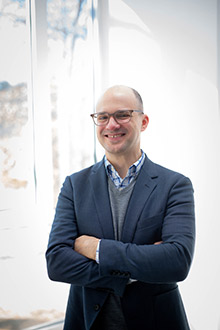
Kevin C. Karnes has been appointed vice provost for the arts at Emory. He will work with faculty, students and staff to envision and realize a comprehensive strategy for creating a thriving arts culture on campus.
Kevin C. Karnes, chair of the Department of Music in Emory College of Arts and Sciences, has been appointed vice provost for the arts. In this new role, Karnes will work with faculty, students and staff to envision and realize a comprehensive strategy for creating a thriving arts culture across the university.
Priorities for the vice provost for the arts include enabling cross-functional collaboration for existing university arts programs and venues; developing new and impactful curricula; attracting and retaining eminent faculty and students focused on the arts; and overseeing comprehensive communications and fundraising efforts for arts at Emory.
“Emory is home to a dynamic, creative community of faculty and students. As vice provost for the arts, Kevin Karnes is the ideal person to help the university build on this foundation, bolster our focus on the arts with an inclusive and interdisciplinary approach and become the preeminent destination for current and future arts leaders, while growing our engagement in Atlanta and beyond,” says Interim Provost Jan Love.
Karnes also will identify and advise university leadership on new partnerships with arts organizations and creative industry throughout the region and nationally.
“We’re already working on a number of projects that will impact students across campus,” Karnes says. “For example, we’re piloting an Emory Arts Fellows program to bring local artists into the classroom, not only to teach their craft but also to help our students navigate artistic career paths after graduation. We’re planning concerts in which Emory musicians will play side-by-side with members of the Atlanta Symphony Orchestra. And we’re talking with community partners about developing internship opportunities in creative industry, particularly film.”
Redefining the arts in Emory’s future
The vice provost for the arts role is strongly tied to the goals of the university’s strategic framework, “One Emory: Engaged for Impact,” and will support Emory’s work to harness discovery and create a culture of innovation that enhances scholarship and creative expression.
Karnes co-chaired Emory’s Task Force on the Future of the Arts with alumnus Doug Shipman, president and chief executive officer of the Woodruff Arts Center. The task force, convened within the context of “One Emory,” identified priorities through 2025 to increase the impact of the arts across campus and to ensure Emory’s recognition as a leading research institution offering world-class liberal arts programs.
Focusing on four thematic areas, the task force advocated for:
- Creating new academic offerings, including a focus on career paths after graduation, graduate programs and artist-in-residence opportunities;
- Developing strategic institutional relationships outside Emory;
- Establishing spaces for artistic creation, presentation and public interaction;
- Providing creative support for faculty, students and staff.
Now being reviewed by Emory leadership for further action, the task force’s report defined interconnected initiatives that will make Emory a preeminent local, national and global destination for learning, collaborating and creating in and through the arts.
Transforming Emory’s music department
A professor of music history, Karnes researches musical expressions of identity, difference and belonging in eastern and central Europe from the 19th century to the present. His work explores archives and ethnomusicological fields, engaging projects in such domains as sound studies, art history, anthropology, philosophy, Jewish studies and Baltic studies.
Karnes served as chair of the Department of Music from 2010 to 2014 and again from 2017 to 2019. During his tenure, he oversaw the design and implementation of a new, three-track bachelor of arts curriculum that enables students to focus their studies on performance, research or composition.
He also expanded possibilities for teaching and research by substantially increasing giving to the music department; led efforts to diversify music department programs and community through new faculty hires and the creation of Emory’s first-ever course offerings in the music business and hip-hop studies; and partnered with donors and colleagues to develop a program supporting undergraduate research in music.
“Kevin’s appointment is an exciting and critical moment for the arts at Emory. His inclusive leadership and passion for the arts as a scholar, teacher and performer will serve Emory well as he works to increase our engagement with Atlanta, enhance the student experience and help campus leaders to plan for the future,” says Michael A. Elliott, dean of Emory College of Arts and Sciences.
The department also built a prestigious undergraduate music studies program under Karnes’ leadership, providing the foundation for students to enter graduate music programs at Harvard, Oxford, Columbia, the University of Chicago, Indiana University and King’s College London.
“We’ve become more diverse and welcoming as a community and are more connected to Emory students, to Atlanta and to the world as a whole,” Karnes says of the department’s growth. “A profound commitment to the arts runs across senior leadership at the university. It truly feels like a ‘moment’ for the arts at Emory, which comes just as a number of Atlanta arts organizations are looking to partner with us on programming and student-centered endeavors.”
Karnes’ interest in music began in fifth grade, when the school’s band director visited his class. “He had a lot of instruments for us to try,” Karnes says. “The trombone looked so different from all the others that I thought, ‘That’s the instrument I want to play.’” He worked as a professional trombonist for two years after college before attending graduate school.
Karnes received his BS from the Massachusetts Institute of Technology in mathematics and management science in 1995, his MMus from the University of Washington in 1996 and his PhD from Brandeis University in musicology in 2001.
He has spent the last five years studying and writing about the Estonian composer Arvo Pärt, who has been the most widely performed living composer in the world during the past decade.
